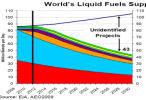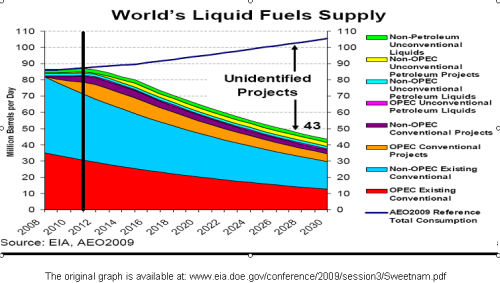
After 10 years of negotiations, Russia's Gazprom and China's CNPC have finally signed an historic natural gas supply deal which will make them partners in post peak-oil industry for the forseeable future. Russia's relatively huge oil and gas reserves [1] have hardly been tapped due to financial depression following post USSR break-up and generally less wasteful exploration policies prior to this. Russia's future is buoyant, compared to the United States, where gas supplies are inadequate to meet the needs of domestic customers, oil peaked in the 1970s and fracking won't deliver anything like what it promised. In cooperation with China, Russia's position alongside China at the gateway to the Arctic, to the Caspian, and the Middle East put it in an remarkable new position.
 Russia, although it has known great hardship, has the benefited from this by being in touch with reality and knowing the value of good technological and scientific advice. Putin is highly intelligent and uses the media brilliantly, aiming at intellectuals who have become disgusted with the western mainstream media. He treats material in a complex and verifiable way, rather than relying on slogans and ideology. He has forged alliances all over the world with countries that the United States has alienated. Most of them have energy reserves of their own and want alternative markets.
Russia, although it has known great hardship, has the benefited from this by being in touch with reality and knowing the value of good technological and scientific advice. Putin is highly intelligent and uses the media brilliantly, aiming at intellectuals who have become disgusted with the western mainstream media. He treats material in a complex and verifiable way, rather than relying on slogans and ideology. He has forged alliances all over the world with countries that the United States has alienated. Most of them have energy reserves of their own and want alternative markets.
The US has been touting itself as a future supplier of gas to Europe in what Max Keiser and Stacy Herbert have called, "A hoax energy policy in america using phoney numbers." You wonder how the United States itself, let alone Europe, the UK and various sycophants like Australia could have fallen for this. Are the US and EU leaders the actual fraudsters? Max Keiser thinks that these leaders are simply too economically and technologically uneducated to see through the bankster spin.
Bloomberg: Cost of fracking in the US greatly exceeds returns
On 25 October 2013 in "EIA should provide data on cost of North American shale gas exploitation to make balanced reports," I asked EIA spokesman, Dr Fawsi, to tell me what the cost of production in fracking was. He said the EIA had the information but would not release it. However Bloomberg obtained the relevant information and published it in February under the headline: Bloomberg"Dream of US Oil independence slams against shale costs."
"Just a few of the roadblocks: Independent producers will spend $1.50 drilling this year for every dollar they get back." And, "Shale output drops faster than production from conventional methods. It will take 2,500 new wells a year just to sustain output of 1 million barrels a day in North Dakota's Bakken shale, according to the Paris-based International Energy Agency. Iraq could do the same with 60."
Financial terrorists
The video linked to at the top of this article tells us how this works: Companies get finance for shale-oil/fracking schemes that cannot break even and then abandon the schemes and the financier and shareholders. They pocket all the financial fees from creating the debt and walk away from the ecological damage and the unrecoverable debt. Max Keisor aptly describes these actors as 'financial terrorists'.
Stacey Herbert asks Max Keiser, ""Who are these people that can spend a $1.50 to earn a dollar?"
Keiser replies, "Banks, which create the debt. It's like the old joke, you lose a dollar for every unit you sell, but you make up on the volume.""
It works the same way for big development schemes, which cannot make money for their investors for the same reason that fracking cannot, that is, because the real cost of materials and fuel have largely obliterated profit margins. We are in a post-cheap petroleum world where profits can only be puffed up by spin.
Melbourne, Australia: EastWest Link and other dodgy developments
The East-West Link project which so many in Melbourne, Australia are protesting about, has been promoted with projections of fuel costs declining over the next ten years. You would not think that any competent government could believe such a scenario. Is it incompetence, ideology - or are our governments simply acting on behalf of the banksters when they force taxpayers to commit to massive structural engineering projects in the service of a ballooning population?
The Australian Government is proposing to get rid of two organisations: - the Australian Renewable Energy Agency and the Clean Energy Finance Corporation - that make money by investing in companies producing renewable energy products. They have rightly been criticised for this by Jenny Goldie, President of Sustainable Population Australia, who wrote on :
"There is no rational basis for this move, merely senseless ideology. Even if the government is so scientifically illiterate as to reject climate change, there is a need to shift to renewable energy in light of impending peaks of oil and gas." Jenny Goldie, The Age "Letters", 25 May 2014.
But, is it just ideology or it possible that the government actually believes that alternative energies represent a threat, as in competition, to their corporate friends who have invested in fossil fuels and nuclear? My understanding of flow energies and the finitude of uranium and untested nature of thorium supply and the commercial inviability of GenIV reactors leads me to believe that there is no competition with these fossil fuels, technologies and elements in terms of quantum of energy from flow energies.
Apart from not wanting to exacerbate climate change, the point of alternative/flow energies is that as fossil fuels become less and less available to people, they need alternatives to survive according to basic requirements.
Even so, those flow energies are not going to provide even the basics, if we do not allow population to decline.
Unfortunately the Australian government really seems to be taken in by economic dematerialisation spin on the one hand and by underestimates of likely draw-down on coal and other fossil fuels over the next fifty years as they are called upon to replace petroleum fuels. Our government - like the United States' - behaves as if gas is in endless supply and as if fracking will be an effortless bonanza. Perhaps this failure to carefully study the matter stems from the fact that Australians have not yet actually had to survive serious interruptions to fossil fuel supply... yet ... such as happened to European countries involved in WW1 and WW2, who take this prospect seriously. Australia's petroleum supplies have, however, more or less dried up. We are going to be relying on increasingly dirty fuels to supply power. We cannot afford to build anything like the quantity of nuclear power plants our population would require just to replace its current electricity consumption.[2]
As an Australian, I do not crow about this, but I could see it coming a long time ago. I know that the world could, in theory, survive energy decline if the power-elite would only allow populations to decline in size; if the unions and business would allow us all to start working (and therefore producing and consuming) half as much. Without constant growth in population, prices for resources and housing would not keep climbing. Quite quickly housing prices would drop. Energy resources and water would reduce more slowly, in line with population. We would not need to work so many hours, each of us, merely to pay rent or mortgages. We would have time to live and engage politically in communities which themselves would naturally relocalise, in view of adapting to declining energy reserves less supportive of daily commuting and longer journeys. [3]
NOTES
[1] "Russia Reveals Official Data on Oil and Hydrocarbon Reserves For The First Time", Oil & gas Eurasia, July 12, 2013.
[2] Sheila Newman, "France and Australia after oil," Chapter 19, Sheila Newman, Ed., The Final Energy Crisis, 2nd Ed., Pluto Press, 2008.
[3] "Countering propaganda with simple solutions: Propaganda about a ‘dematerialised economy’ makes it hard to establish the reality that material industrial productivity is not actually less reliant on burning fossil fuels than it was in the 1970s, and that drawdown on fossil fuels has in fact been multiplied by the needs of much greater populations. Similarly the obvious still needs to be pointed out that increasing productivity means burning more fuel and outputting more pollution, accelerating petroleum depletion and adding more greenhouse gases. Not only do we not need all the goods we produce for consumption at home or abroad, we do not need the income they bring, and their acquisition is a poor compensation for lives given to industry. Wonderful jobs are few and far between. No-one wants to give those up. Some people also derive much of their social life from work but they would derive similar benefits, and perhaps more status and satisfaction, from other community activities. And plenty of people reach a stage of maturity where childlike obedience to workplace regimes in the cause of producing more and more widgets in different colours, or processing more and more customers a day, with unflinching subservience, challenges every natural instinct.
Instead of those complicated international agreements about percentile reductions in emissions over the years to come, which are hardly enforceable or even measurable, remaining mostly in the control of the corporate emitters, the solution lies much closer at hand, and could ultimately be controlled at grass-roots levels by the masses themselves. Relocalisation is obviously the best way to develop the solidarity and self-sufficiency to reorganize work.
Political commentator and climate activist, Clive Hamilton, writes in Growth Fetish,
Reduction in working hours is the core demand for the transition to post-growth society. Overwork not only propels overconsumption but is the cause of severe social dysfunction, with ramifications for physical and psychological health as well as family and community life. The natural solution to this is the redistribution of work, a process that could benefit both the unemployed and the overworked. (Hamilton, Clive, Growth Fetish, Allen & Unwin, Australia, 2003 and Pluto Press UK, 2005, last chapter, especially, pp.218-220)
He remarks that “Moves to limit overwork … directly confront the obsession with growth at all costs,” and talks about the liberation of workers “from the compulsion to earn more than they need.”
Because growth is sustained by a constant ‘barrage of marketing and advertising’ Hamilton wants advertising taxed and removed from the public domain, and television broadcast hours limited so as to “allow people to cultivate their relationships, especially with children.”
It should be obvious that the slower we work, the more fuel will remain, the less greenhouse gas will be emitted. If the populations which have ballooned to unimaginable proportions since the 1950s were allowed to return (through natural attrition) to more natural sizes by 2050, and the economy permitted to slow, it would take the heat off the planet and us as well. With so much less effort we could make such a positive difference to the planet and to our personal effectiveness." Original Source: Sheila Newman, Ed., "101 Views from Hubbert's Peak,"Chapter 1, The Final Energy Crisis, Pluto Press, UK, 2008
 It seems that many of the leading ‘social change’ agents are enthusiastically piling on the bandwagon to reinforce, not change, one of the most significant problems now threatening society at both the global and local scale.
It seems that many of the leading ‘social change’ agents are enthusiastically piling on the bandwagon to reinforce, not change, one of the most significant problems now threatening society at both the global and local scale.
 After 10 years of negotiations, Russia's Gazprom and China's CNPC have finally signed an historic natural gas supply deal which will make them partners in post peak-oil industry for the forseeable future. Russia's relatively huge oil and gas reserves [1] have hardly been tapped due to financial depression following post USSR break-up and generally less wasteful exploration policies prior to this. Russia's future is buoyant, compared to the United States, where gas supplies are inadequate to meet the needs of domestic customers, oil peaked in the 1970s and fracking won't deliver anything like what it promised. In cooperation with China, Russia's position alongside China at the gateway to the Arctic, to the Caspian, and the Middle East put it in an remarkable new position.
After 10 years of negotiations, Russia's Gazprom and China's CNPC have finally signed an historic natural gas supply deal which will make them partners in post peak-oil industry for the forseeable future. Russia's relatively huge oil and gas reserves [1] have hardly been tapped due to financial depression following post USSR break-up and generally less wasteful exploration policies prior to this. Russia's future is buoyant, compared to the United States, where gas supplies are inadequate to meet the needs of domestic customers, oil peaked in the 1970s and fracking won't deliver anything like what it promised. In cooperation with China, Russia's position alongside China at the gateway to the Arctic, to the Caspian, and the Middle East put it in an remarkable new position. Russia, although it has known great hardship, has the benefited from this by being in touch with reality and knowing the value of good technological and scientific advice. Putin is highly intelligent and uses the media brilliantly, aiming at intellectuals who have become disgusted with the western mainstream media. He treats material in a complex and verifiable way, rather than relying on slogans and ideology. He has forged alliances all over the world with countries that the United States has alienated. Most of them have energy reserves of their own and want alternative markets.
Russia, although it has known great hardship, has the benefited from this by being in touch with reality and knowing the value of good technological and scientific advice. Putin is highly intelligent and uses the media brilliantly, aiming at intellectuals who have become disgusted with the western mainstream media. He treats material in a complex and verifiable way, rather than relying on slogans and ideology. He has forged alliances all over the world with countries that the United States has alienated. Most of them have energy reserves of their own and want alternative markets. The supply of the world's most essential energy source is going off a cliff. Not in the distant future, but within two years. Production of all liquid fuels, including oil, will drop within 20 years to half what it is today. And the difference needs to be made up with "unidentified projects" – in other words, we face a potential ‘rank shortage’. According to this graph, we stand on the edge of a precipice, with no prior warning from either the industry or governments, which ostensibly protect the public interest.
The supply of the world's most essential energy source is going off a cliff. Not in the distant future, but within two years. Production of all liquid fuels, including oil, will drop within 20 years to half what it is today. And the difference needs to be made up with "unidentified projects" – in other words, we face a potential ‘rank shortage’. According to this graph, we stand on the edge of a precipice, with no prior warning from either the industry or governments, which ostensibly protect the public interest.


Recent comments